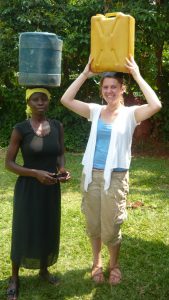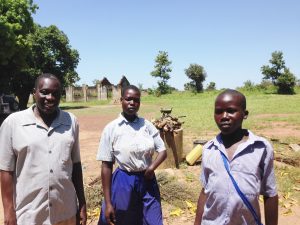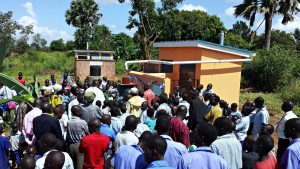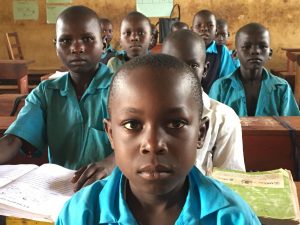
Our stakeholders: Over half of the primary schools in Gulu District suffer from unhygienic toilets and a lack of water
This summer, The Advocacy Project will resume support for one of our most successful initiatives – the installation of accessible toilets at primary schools in Gulu District, Uganda.
The program was suspended in 2020 as a result of the pandemic and we hope that its resumption will help to revive education in Northern Uganda after two years of brutal lock-down. This will be the fifth school to benefit from our support. After installing a WASH package in four primary schools since 2015 our Ugandan partner, the Gulu Disabled Persons Union (GDPU), can be counted on to do a fine job!
This blog provides some background.
The toilet program dates back to 2011 when Rebecca Scherpelz a Peace Fellow who was working at GDPU wrote a memorable blog – ‘The (in)accessible Toilet – when Nature Calls and Society Hangs Up’ – about the scandalous lack of public accessible toilets and the problems this created for people in wheelchairs. The blog was widely read and Rebecca herself returned to school (University of Maryland) on a mission. She launched a fundraiser (entitled “Please Give a S#*t!) and raised around $2,000 – enough to pay for an accessible toilet back in Uganda.
The task of spending Rebecca’s small windfall fell to Patrick Ojok, the GDPU program manager, and John Steies, who succeeded Rebecca as the Peace Fellow at GDPU in 2013. They decided on the Gulu bus park in the town center which was widely frequented by people with disability and installed a splendid toilet with a porcelain bowl, sink, faucets and flushing water. John and Patrick pulled out all the stops to complete the project in time, and wanted nothing but the best for their clients. But a crowded bus park with a transient population was probably not the best location for a sophisticated toilet and it was quickly vandalized.
It might have worked if someone had assumed responsibility for the toilet and charged fees, but the people who most needed to use the toilet were in no position to pay. Lacking stakeholders, the toilet went the way of so many development dreams that are designed from afar with the best of intentions and imposed on communities with no incentives to make them work.
*
At the same time, the problem identified by Rebecca itself had not gone away and some important lessons had been learned. GDPU and AP decided to explore the idea of accessible toilets in a completely different environment – schools – where the importance of hygiene is well understood by the teachers and parents.
In the summer of 2014, I visited the Tochi Primary School (489 students) with Partick from GDPU and Kathryn Dutile, an AP Peace Fellow who was studying WASH at Manchester University.
We were shocked at the state of the school toilets and even more shocked to learn that toilets were intricately linked to bullying and disability. It turned out that school bullies were smearing feces on the handrails of the school’s single accessible toilet to frighten students with a disability. One student in particular, Ivan Olanya, was being singled out because other students were jealous of his good grades. I described our findings in this news bulletin. It was clear that toilets were playing a large – and rather nasty – role in the life of the Tochi school and community.
This visit opened the way to what has become one of AP’s most imaginative and important programs. With Patrick in the lead, GDPU and AP decided to raise funds to build a new toilet at Tochi that was fully accessible, and back it up with inclusivity training to educate students and staff about disability, bullying and hygiene.
The task of coming up with the money again fell to our 2015 Peace fellow Josh Levy. Josh launched a Gofundme campaign and raised over $4,000, which was enough to cover the cost in installing the first accessible toilet at the Tochi School. He then helped Patrick to oversee the project (and became well known in the village for taking his pet monkey to the site).
Enrolment rose at the Tochi school after the toilet was installed and AP has made a point of visiting Ivan in subsequent years. He is now in college – perhaps the best indicator of success!
*
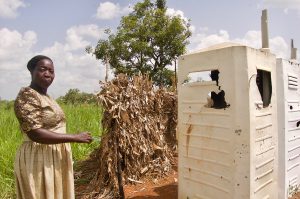
Before the renovation: Prisca Okello, principal at the Ogul School, took a group of parents and carried back these abandoned toilets from an IDP camp to make up for the lack of toilets at her school
By the summer of 2016 Patrick had visited more schools and realized that students with a disability were not the only victims of filthy, unhygienic toilets. So why were we only focusing on their needs? This seemed unfair and even discriminatory. Together, GDPU and AP decided that if there was to be another toilet project, it would benefit the entire school.
The toilet project raised almost $5,000 in 2016, thanks to a generous donation from the online giving platform Givology. We sent Amy Gillespie, a Peace Fellow who had been trained as a social worker, to help GDPU install the WASH package at a second school. Unfortunately, it was too late to begin that summer and the money was rolled over to the following year.
Work began at the Ogul School in June 2017 and drew on the Tochi experience. By now GDPU had refined its procedures and put out a call for three tenders. The selected contractor did a fine job and one reason was that his team was from the local community, as our Peace Fellow Lauren Halloran noted in one of her blogs. (The welder Abonga Collins had even studied at the school.) The new toilets were opened in August and by the end of the summer several hundred more students were benefitting from a healthy school environment.
Lauren was succeeded as the GDPU Peace Fellow in 2018 by Chris Markomanolakis, a student at the University of Maryland who had worked in the Peace Corps and was addicted to field work. Patrick had met with the District Education Officer (DEO) and together they had agreed to refurbish the toilets at the Awach Central Primary School. This would be a major undertaking because the school had 991 students – more than twice as many as Tochi. Moreover, over a hundred had a disability. The Awach toilets were in terrible shape but Chris rolled up his sleeves (literally) and developed an ambitious plan and budget with Patrick. Chris also put out the word to his own network and submitted a proposal to Water Charity, which agreed to provide some much-needed support.
The team decided to install several new stances (individual stalls) at Awach, one of which would be accessible, and renovate another block of stalls which were basically unusable in their current shape. Patrick and Chris also addressed the special needs of girl students. Not only did girls have to wait in line for ages, but many were having perio
ds and needed some private space where they could change and dispose of used tampons. GDPU responded by constructing a changing room for girls only. This important feature quickly became part of GDPU’s evolving WASH model.
The second noticeable feature of the Awach project was the involvement of the parents. This had always been central to GDPU’s vision because it gave parents a practical way to engage with the education of their children, and parents had been a big help to Lauren during the Ogul project.
But the number of volunteer parents at Awach – well over 100 – surprised even GDPU. They spent three days digging out a large latrine pit for the new toilets, while the long-suffering contractors were also given the unpleasant task of emptying the existing latrine, which was overflowing. This had to be done by hand, in the boiling sun, and took several days. Chris spent several hot and smelly hot days at their side, recording the process.
*
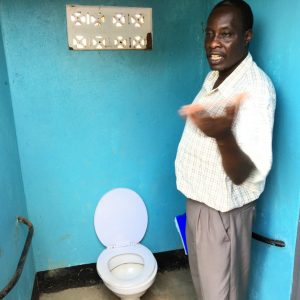
After four successful schools projects, Patrick Ojok at GDPU is recognized as an authority of WASH, disability and education in Northern Uganda
In November of 2018, I visited Gulu for AP and assessed progress at Tochi, Ogul and Awach with Patrick and Emma from GDPU. We were encouraged by what we found, starting with a surge in enrolment at all three schools.
We also visited several schools which badly needed new toilets and decided on the Abaka Primary School, where only two stalls were in use for over 400 students. By now I was used to tramping around disgusting toilets, but the conditions at Abaka were worse than anything I had seen up to this point. Most students walked home to relieve themselves or went into the jungle where they risked attack from wild animals. They were also using a makeshift toilet in the fields where the floor was thick with maggots and liable to cave in at any moment. I documented what we saw in this short video and caught Patrick saying that students were afraid of falling through the toilet floor and drowning. (It was, said Patrick, not an unreasonable fear).
Water was another disaster. The school’s borehole, which was the only source of water outside the rainy season, was broken. This meant no handwashing – and a further threat to the health of the students. Patrick and I realized that water would have to be added to the GDPU’s checklist for any future toilet projects. We had little hesitation in designating Abaka as the next project school and Patrick saw it through to a successful conclusion in August 2019, with advice from Peace Fellow Spencer Caldwell.
*
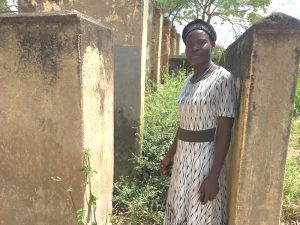
Evelyn Acer, principal at the Lapuda School, signed up for GDPU toilets in 2020, before the pandemic struck
By the end of 2019 GDPU could be well pleased. Over 3,000 Ugandan High School students were enjoying a hygienic education in the 4 primary schools, and GDPU’s community-based WASH model was well known in Gulu District. (The model is described in detail on the AP site.) Patrick was recognized as a leading authority on education, disability and WASH in northern Uganda and the GDPU model had the stamp of approval from the DEO Cesar Akena. Given that there were 55 primary schools in the district and well over half needed new toilets, there was reason to hope the government would use GDPU’s community approach in funding future WASH projects.
GDPU’s toilets cost much less than WASH projects funded by the district government or large international NGOs, but they were still expensive. In 2018 we received a welcome offer from the Global Missions Committee at the Prince of Peace Lutheran Church in Dublin Ohio, to donate $6,000 from the proceeds of the church’s annual rummage sale. We had Rebecca, our Peace Fellow who had launched the toilet project back in 2011, to thank for making the introduction. Rebecca was an active member of the church and her father Ken led the Committee. The committee pledge was open-ended and this has allowed us to make a long-term commitment to GDPU. We also received a generous grant from the North Kingston Rotary club in Rhode Island.
In addition, as noted above, several Peace Fellows have launched their own fundraisers, and Chris made a major contribution by securing a grant from Water Charity. We also launched several appeals on GlobalGiving which pulled in over $5,000. All in all, AP raised over $35,000 for the four school WASH projects between 2015 and 2020.
It all seemed to be moving in the right direction when I made another visit to Gulu late in 2019 to identify the next school. At the recommendation of the District Education Officer, we made our way to Lapuda, where we found the same dismal story of blocked toilets, collapsing walls, anxious teachers and frustrated students as shown in this video.
But Evelyn Acer, the head teacher at Lapuda, was impressive and would clearly make a wonderful partner for GDPU. Patrick and Evelyn agreed to start work in the summer of 2020 and we headed back to Gulu town in high spirits. Everything seemed set fair for another productive summer.
And then came COVID-19.
*
The pandemic was not the first hammer blow to fall on the education system in northern Uganda. Twenty years earlier, the brutal Lord’s Resistance Army (LRA) had declared war on civilians throughout the North and provoked a savage response from the Ugandan authorities. Schools were closed throughout the region and civilians forced to move into massive displacement camps. The remnants of this crisis are still clearly visible throughout Gulu. When we visited the Ogul School in 2017, the head teacher told us that she had travelled to an abandoned IDP camp with parents and carried several portable toilets back to her school. (Photo).
COVID-19 added to the strain by closing down education for more than two years and put immense pressure on families that were already struggling to support their local schools.
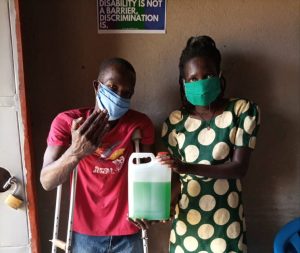
Freeman, left, developed his own brand of liquid soap named Clean Wash. His start-up was funded b y AP 2020-2021 and will be folded into the WASH schools program
Unfortunately, we could do nothing to help the schools, but we did support two innovative start-ups by GDPU stake-holders that addressed the crisis in personal hygiene and brought in money.
The first start-up was launched by Mama Cave, a inspiring tailor with a disability. Mama Cave created her own brand of face-masks (“Mama Masks”) and sold several hundred masks in 2020 and 2021. The second entrepreneur, Freeman, collected a group of friends with limited physical mobility and produced a liquid soap, which they branded “Clean Wash.” Freeman got off to a quick start and sold over 500 liters by the end of 2020.
But by the end of 2021, both start-ups were facing severe competition and a saturated market. As a result, AP and GDPU decided to wrap both start-ups into the WASH program in 2022, assuming that work could begin at a new school. We asked Freeman’s team to produce soap for whatever school was chosen and made the same offer to Mama Cave, because face-masks were still required in Ugandan schools. Mama Cave proposed to produce masks for the designated school in the school colors and carrying the student’s name.
Meanwhile, back in the US, we put out the word for a graduate student to pick up where previous Fellows had left off in 2019 and work alongside Patrick and Emma to install the fifth set of toilets. We were fortunate to receive an application from Kyle Aloof, who had taught in Sierra Leone before enrolling at Texas A&M university. Back in the US, Peace Fellow Aimee Benitez at UCLA was assigned to back up Kyle.
Kyle and Aimee will write blogs as a team and we look forward to reading about the next stage of GDPU’s bold experiment to revolutionize water, hygiene and sanitation at schools in Gulu District.
Posted By Iain Guest
Posted Jun 1st, 2022


